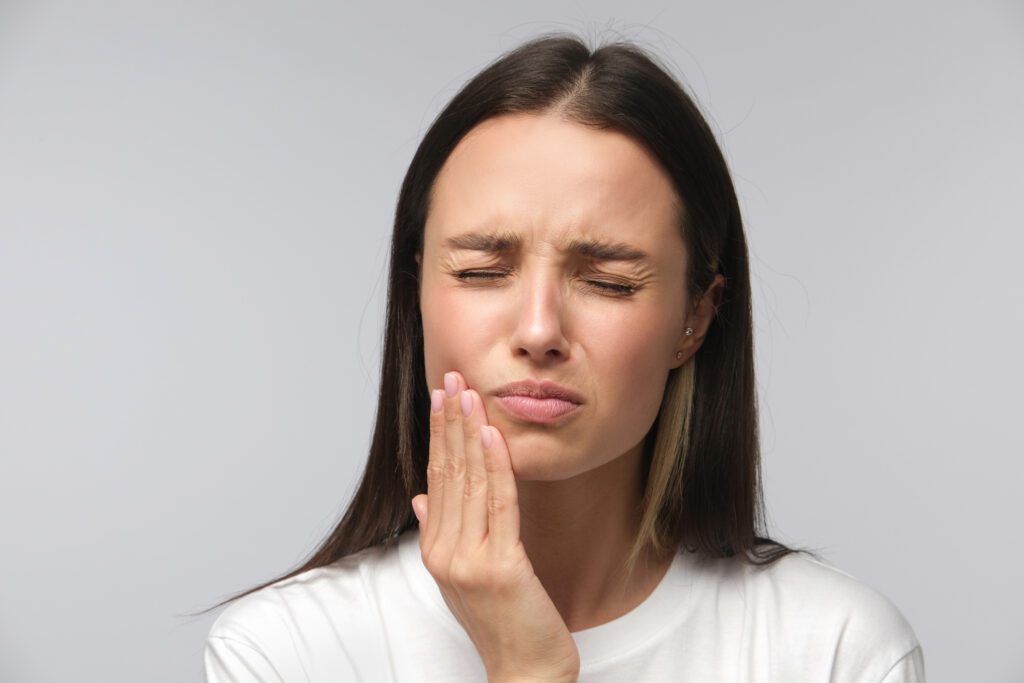Believe it or not, if you suffer from jaw pain, frequent headaches, earaches, and pain in your neck, shoulders, and back, you could be dealing with what is known as a temporomandibular joint disorder. Also called TMD or TMJ, this condition refers to any one of multiple issues that can affect the health of your temporomandibular joints.
Advanced Dental Associates is here to help if you are suffering from TMJ and require TMJ treatment to restore your smile in San Antonio, TX. We also provide restorative dental care treatments at our San Antonio, TX, dental office.

How Do the Temporomandibular Joints Work?
The temporomandibular joints, or TMJ, are found on each side of your mouth. They are one of the most complex joints in your body and help you open and close your mouth. While this might not seem like much at first glance, the ability to move your mouth is crucial for many important tasks.
You need to be able to open and shut your mouth to eat, speak, swallow, yawn, and so much more. The joints work in harmony with your jawbone and muscles, ligaments, and cartilage. If something interferes with this balance, pain, and difficulties arise.
How Does TMJ Happen?
There is no one singular cause of TMJ. Many issues can interfere with the proper movements of your joints. Common issues include bruxism, which has many of its causes, as well as facial trauma.
These issues irritate the jaws. Since you cannot stop using your mouth, the constant movement and pressures exerted on these joints can irritate and worsen. They can also cause inflammation, significant pain, and trouble making the slightest movements.
TMJ Treatment in San Antonio, TX
Sometimes you can treat TMJ at home. This is typically only possible with mild cases of TMJ. Jaw exercises or massages can help to loosen the muscles and joints so they work properly. You may be able to help avoid irritating your joints by avoiding certain types of foods, such as those that are large, hard, or crunchy.
Sometimes, an over-the-counter pain reliever can help alleviate your discomfort. If you take pain relievers, only take them as directed on the bottle. The most common solution is a nighttime mouthguard, which is often recommended for those with bruxism. We create a custom oral appliance for you to wear while you sleep. The guard protects your teeth, jaws, muscles, and joints.
In cases of poor teeth alignment, orthodontic treatment may be recommended. This may be in the form of traditional braces or Invisalign. Correcting your tooth and jaw alignment can enable more natural bite function and improve symptoms.
Botox for TMJ
Botox injections have emerged as an effective, non-invasive solution for relieving TMJ-related symptoms. Botox (botulinum toxin) is most well-known for its cosmetic uses, such as reducing wrinkles and fine lines. However, Botox has also proven to be highly effective in treating a variety of medical conditions, including TMJ disorders. Botox works by temporarily relaxing the muscles that cause pain and tension in the jaw. It targets the muscles responsible for jaw clenching and grinding, known as the masseter and temporalis muscles.
When injected into these muscles, Botox blocks the release of acetylcholine, a neurotransmitter that signals muscle contraction. This reduces muscle activity, helping to relieve the strain and tension in the jaw. The result is less pain, fewer headaches, and improved jaw function.
Benefits of Botox for TMJ
Relieves Jaw Pain: One of the most significant benefits of Botox for TMJ is its ability to relieve jaw pain. By relaxing the overactive muscles in the jaw, Botox can reduce muscle tension, preventing the painful spasms that often occur with TMJ disorders. This provides long-lasting relief for patients who have struggled with chronic jaw pain.
Reduces Headaches and Migraines: Many individuals with TMJ disorders suffer from frequent headaches or migraines due to muscle tension and jaw clenching. Botox injections can reduce the frequency and severity of these headaches by relaxing the muscles that contribute to tension headaches and migraines. For many patients, Botox can offer a significant reduction in headache symptoms, leading to a better quality of life.
Prevents Teeth Grinding and Clenching: Teeth grinding (bruxism) and jaw clenching are common behaviors associated with TMJ. These habits often occur during sleep, leading to worn-down teeth, jaw pain, and discomfort. Botox helps to reduce the intensity of grinding and clenching by relaxing the muscles, making it easier for patients to break the cycle of teeth grinding and prevent further damage.
Non-Invasive Treatment: Botox is a minimally invasive procedure that doesn’t require surgery or downtime. The injections are quick, typically taking just 15-20 minutes to complete. Most patients can resume their normal activities immediately after the procedure, making it a convenient option for people with busy schedules.
Long-Lasting Results: The effects of Botox for TMJ typically last between 3 to 6 months, depending on the individual and the severity of their symptoms. While the treatment isn’t permanent, it provides long-lasting relief, and patients can return for follow-up injections as needed. Over time, regular Botox treatments may help reduce the intensity of TMJ symptoms as the muscles become accustomed to the relaxed state.
